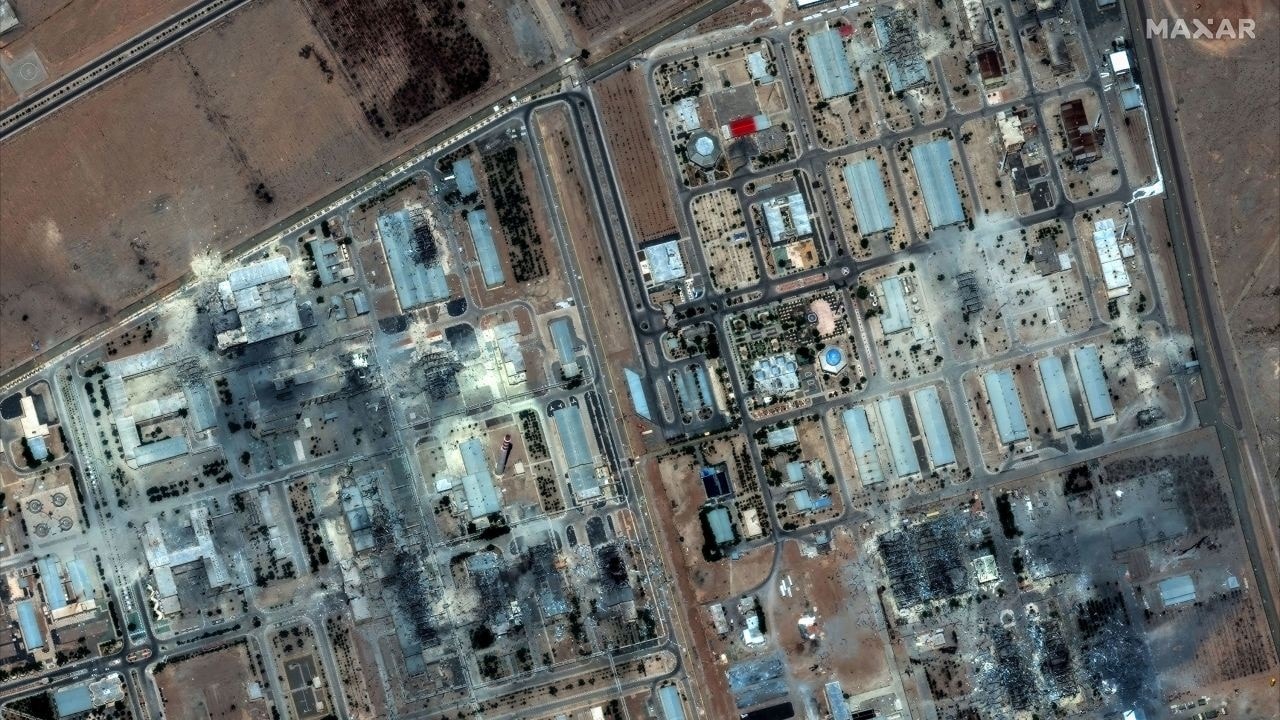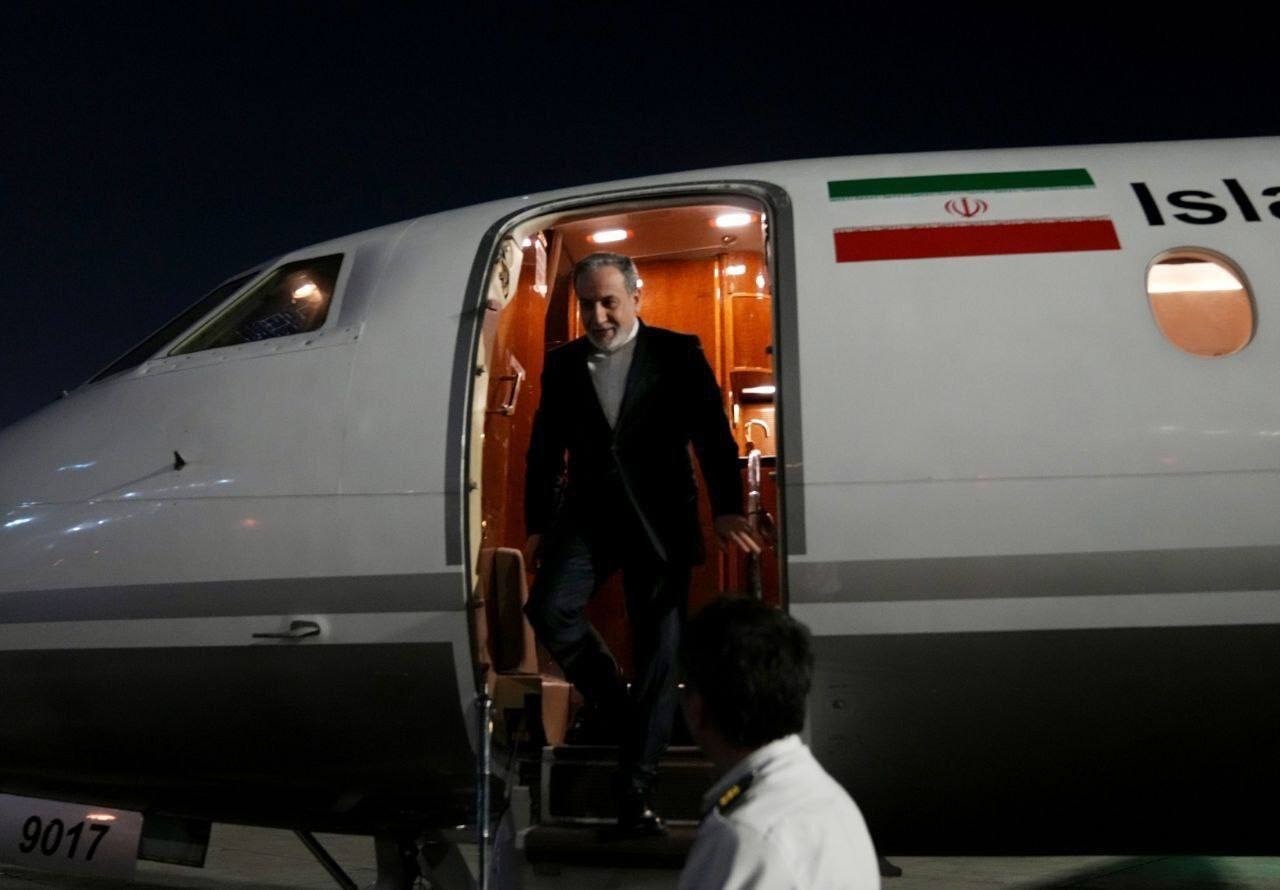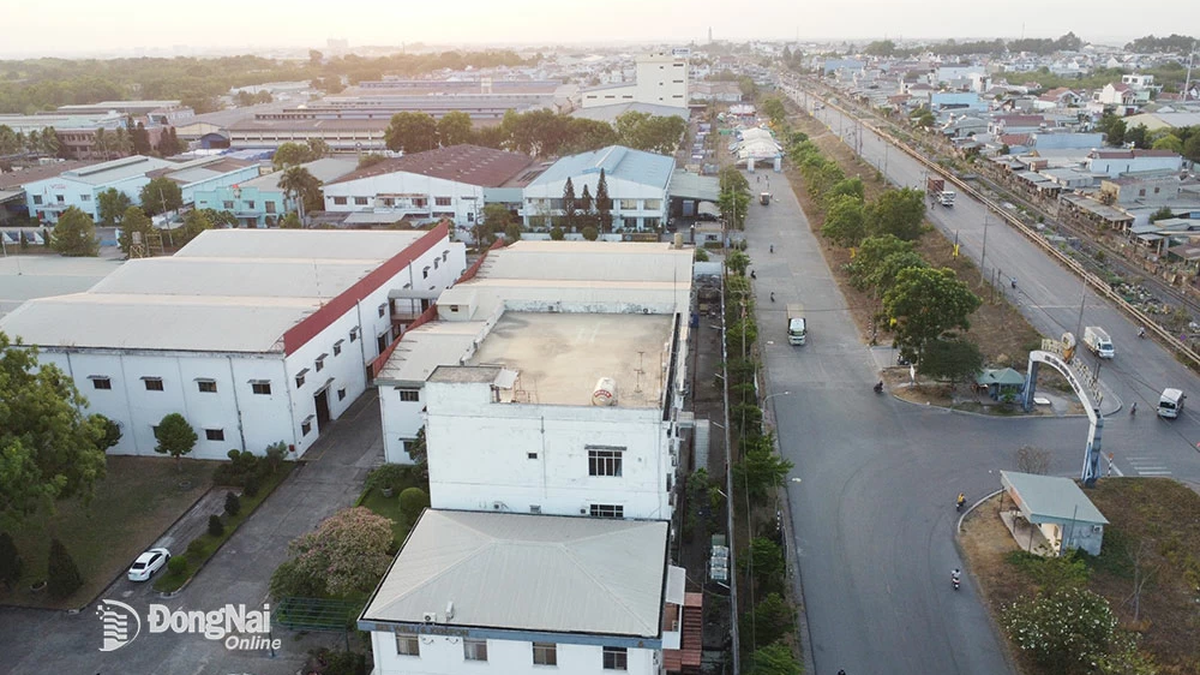Iran activates air defense interceptors
According to Nour News, a media outlet affiliated with the Iranian government , the country's air defense system was activated early Monday morning (local time) to intercept targets appearing in the airspace of the capital Tehran.
At the same time, Nour News also reported that similar targets were being intercepted by air defense forces in the city of Karaj, located northwest of Tehran.
Israel attacks missile launcher in Tehran
On June 22, the Israeli military said it carried out an airstrike on military targets in western Iran and the capital Tehran, including a surface-to-air missile launcher located right in the city center.
 |
| Satellite image of the Nuclear Technology Center in Isfahan. Photo: Maxar Technologies |
In a statement posted on the X platform, the Israeli military said: “About 20 Israeli Air Force fighter jets participated in the attack on military targets in Iran, under the precise guidance of the Intelligence Directorate, with more than 30 types of weapons used. A surface-to-air missile launcher was also destroyed in the center of Tehran.”
The IDF also said the air force hit targets such as military satellites and radar stations in the western Iranian cities of Kermanshah and Hamedan, along with missile storage and launch facilities.
“The IDF continues its efforts to degrade Iran’s military capabilities and gain air superiority in Iranian airspace in order to protect the State of Israel,” the statement said.
UN Secretary General warns of risk of “devastating spiral”
According to AFP, on June 22, UN Secretary-General António Guterres warned of the risk of a “new spiral of destruction” and continued retaliation following the US airstrike on Iran’s nuclear facilities, which he said marked a “dangerous turning point” in the region.
Speaking at an emergency meeting of the United Nations Security Council, Mr. Guterres emphasized: “I have repeatedly condemned any military escalation in the Middle East. The people of this region cannot afford another round of destruction. Yet, we are facing the risk of falling into a pit of endless retaliation.”
Also at the meeting, Mr. Rafael Grossi, Director General of the International Atomic Energy Agency (IAEA), called for restraint, while expressing concern about the possibility of the conflict spreading.
“We still have a window of opportunity to return to dialogue and diplomacy . If that window closes, the violence and destruction could reach unimaginable levels, and the global non-proliferation system as we know it could collapse completely,” he warned.
US fears protests abroad after airstrike on Iran
According to CNN, the US State Department issued a global security alert on Sunday, calling on US citizens to exercise caution and warning of the possibility of protests against US citizens and interests abroad.
“The conflict between Israel and Iran has disrupted travel and caused temporary closures of airspace in the Middle East. There is a potential for protests against U.S. citizens and U.S. interests abroad. We urge U.S. citizens around the world to be vigilant,” the statement said.
The agency also recommends that people visit the Ministry's official website for country-specific updates and the latest security warnings when planning to travel.
The warning comes after the US Department of Homeland Security warned of an “elevated threat environment” in the country, including the risk of small-scale cyber attacks and lone-wolf attacks, especially after the recent US airstrikes on Iran.
According to CNN, many Iranians took to the streets in many public areas to strongly protest the US airstrike on three important nuclear facilities in the country.
Countries send military planes to evacuate citizens
The French Foreign Ministry and the French Defense Ministry said that the French Government will dispatch A400M military transport aircraft to Israel to evacuate French citizens wishing to leave for Cyprus.
According to the ministries, the flights will be carried out after obtaining permission from the Israeli side and will supplement the civilian flights that the country currently charters.
There are currently about 250,000 French citizens living in Israel, of whom about 100,000 are registered with the consulate.
The French Foreign Ministry's crisis response team said it had received more than 4,500 calls in the past week from people needing assistance.
Also on Sunday, 160 French citizens, mainly from vulnerable groups or in urgent situations, were brought from Jordan to Paris on a special flight, accompanied by a doctor from the Ministry of Foreign Affairs.
The ministry said it will continue to organize more evacuation flights in the coming time.
The New Zealand government has announced that it will send a C-130J Hercules military transport aircraft to the Middle East to assist in the evacuation of citizens when conditions permit, as airspace over Israel and Iran remains closed.
Foreign Minister Winston Peters said he was “very concerned” about the safety of New Zealanders in the conflict zone.
“Airspace has been closed since the current conflict began, and it is unclear when it will be reopened. That is why we continue to advise New Zealanders to seek to leave the area as soon as a safe route is available,” he said.
However, Mr. Peters also acknowledged that not everyone can leave Iran and Israel, as many people do not have transportation or access to fuel. “If you find yourself in this situation, you should stay where you are, follow the instructions of local authorities and try to stay in touch with family and friends when possible,” the New Zealand foreign minister advised.
Defence Minister Judith Collins said C-130J transport aircraft would be on standby to assist where possible, and the government was also working with commercial airlines to consider the possibility of assisting with evacuations.
“Airspace over Israel and Iran remains heavily restricted, so air evacuation is not possible at this time. However, by having aircraft and defense and diplomatic personnel in the region, we hope to be able to act more quickly when conditions allow,” she said.
The two ministers stressed the importance of diplomatic solutions and dialogue, and called on all parties to exercise restraint and avoid further escalation of the conflict.
Iranian Foreign Minister arrives in Moscow
Iranian Foreign Minister Abbas Araqchi arrived in Moscow a few hours ago, according to Iranian media. During his visit, he will meet with Russian President Vladimir Putin to discuss “common threats.”
 |
| Foreign Minister Abbas Araqchi has arrived in Moscow. Photo: Fars News Agency |
More people ask to leave Israel
Reuters news agency quoted Israel's El Al airline as saying it received about 25,000 requests to leave the country in just one day.
The Israel Aviation Authority said rescue flights to Israel will be increased starting Monday, with 24 flights per day from various destinations, but each flight will carry a maximum of 50 passengers.
In the face of a wave of calls to leave Israel, El Al announced it would begin operating flights to eight international destinations from Monday.
Meanwhile, Air France KLM said it had cancelled flights to and from Dubai and Riyadh on Sunday and Monday. Singapore Airlines also said it had cancelled flights from Singapore to Dubai following a security assessment, while British Airways cancelled flights to and from Dubai and Doha.
While the cancellations apply only to Sunday, Singapore Airlines warned that other flights between Singapore and Dubai may continue to be affected as the situation remains “unpredictable”.
Oil prices skyrocket
World oil prices rose sharply late Sunday, as Wall Street reacted to the US airstrikes on three key Iranian nuclear facilities, a move seen as a serious escalation in the conflict between Iran and Israel.
US crude futures rose 3.6% to around $76.47 a barrel. Brent crude, the global benchmark, also rose 3.2% to $74.59 a barrel.
 |
| Oil prices surged after US airstrikes on Iran. Photo: Getty Images |
Meanwhile, US stock markets fell following news of the attack. Dow Jones futures fell 250 points, or 0.6%. The S&P 500 fell 0.6%, while the Nasdaq lost 0.7%.
The dollar, on the other hand, rose 0.3%, a positive sign after the currency had been battered by record import tariffs imposed by the Trump administration. The dollar, considered the global reserve currency, has often strengthened in times of international turmoil and conflict, but some market experts remain skeptical that this trend will continue under Trump’s “America First” policies.
TRAN HOAI (synthesis)
* Please visit the International section to see related news and articles.
Source: https://baodaknong.vn/cang-thang-israel-iran-iran-kich-hoat-he-thong-phong-khong-danh-chan-my-lo-ngai-bieu-tinh-chong-doi-256375.html




















































![[Maritime News] More than 80% of global container shipping capacity is in the hands of MSC and major shipping alliances](https://vphoto.vietnam.vn/thumb/402x226/vietnam/resource/IMAGE/2025/7/16/6b4d586c984b4cbf8c5680352b9eaeb0)













































Comment (0)